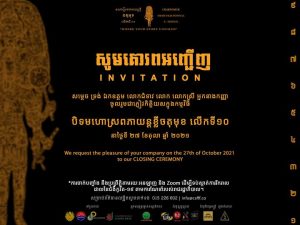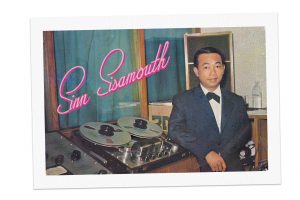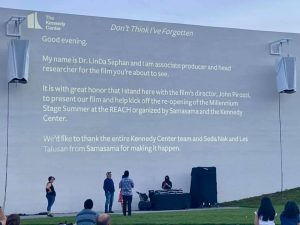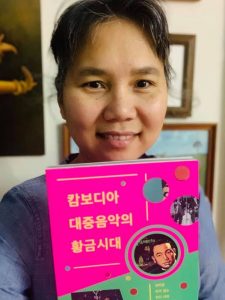Jury member for 2021 Chaktomuk Short Film Festival
What an amazing line up! This year submission was extraordinary for its high quality production value, rising stars and upcoming directors.

For more information on the film festival: http://csff.co/
Overlooked No More: Sinn Sisamouth, ‘King’ of Cambodian Pop Music by Mike Ives published Sept. 9, 2021
“When it came to singing technique, Sinn Sisamouth was king,” Prince Panara Sirivudh, a member of the Cambodian royal family, said in the documentary. “His voice was so beautiful, and he wrote very sweet songs.” Popular Western music was imported to Cambodia as early as the 1940s by the royal palace and by Cambodians who could afford to travel to Europe, and the country’s rock ’n’ roll scene began in earnest in the 1950s, according to a study by LinDa Saphan, the associate producer of the documentary and a professor of sociology at the College of Mount Saint Vincent in New York City. The sound blended high-pitched, operatic singing with the distorted electric guitar solos that were popular in American music at the time. Sinn Sisamouth became representative of this new style because he had an ability to write both ballads and upbeat rock songs, Saphan wrote, but the voices of Ros Serey Sothea and other female vocalists on his recordings were the “final touch that made this Cambodian mix so enticing.”
Early in his career, Sinn Sisamouth was invited to perform with Cambodia’s royal ballet; he appeared in dapper suits and bow ties, his hair combed back. He also traveled overseas — to India, Hong Kong and beyond — with a traditional band formed by the queen’s son, Norodom Sihanouk, a composer and saxophonist (and future king) who played a major role in developing the country’s cultural industries in the postcolonial era. It was a hopeful time in Cambodia’s history: The country had achieved independence from France in 1953 and was shaping its identity and culture. As Sinn Sisamouth’s popularity grew, his former neighbors in the countryside marveled at hearing his songs on the radio. Some referred to him as “golden voice” or the “Elvis of Cambodia.” “A medical student — how can he sing?” the villagers said at the time, his sister recalled in the documentary. He met Ros Serey Sothea when she was 17 at the national radio station and recorded with her for more than a decade. Though they were never romantically involved, “their musical conversations were love stories filled with a sense of yearning and despair, of palpable loss, yet holding out the possibility of reconciliation,” Saphan wrote.

To read the full article
click here
It’s so thrilling to hear Cambodian singers at the Kennedy Center, I feel they have been rightfully acknowledged.
It is with great honor that I stand here with the film’s director, John Pirozzi, to present our film and help kick off the re-opening of the Millenium Stage Summer at the REACH organized by Samasama and the Kennedy Center.
We’d like to thank the entire Kennedy Center team and Seda Nak and Les Talusan from Samasama for making it happen.
Don’t Think I’ve Forgotten itself is a celebration of the universal power of music and its ability to transcend borders and speak to so many people despite their cultural differences.
As it happens Cambodian popular musicians were particularly adept at synthesizing many different styles of music from all over the world and creating music that you may find familiar yet unique at the same time.
The film is a celebration of Cambodian musical creativity and the music’s resiliency.

Popular and Political Songwriting in Cambodia: From Sihanouk’s Prewar Golden Age to Pol Pot’s Khmer Rouge
By LinDa Saphan and Nate Hun
Hun, N., Kim, M., Lee, Y., Nelson, R., Oum, R. O., & Saphan, L.,(2021), The Golden Age of Cambodian Popular Music, Kim, M.(Ed.), Seoul: Hyunsilbook
김미정, 로저 넬슨, 린다 사판, 움 로따낙 오돔, 이용우, 네이트 훈, (2021), 캄보디아 대중음악의 황금시대, 김미정(엮), 서울: 현실문화
Abstract
Music has been prominent in daily life in Cambodia since ancient times. Following centuries of political turmoil and warfare, Cambodia experienced a brief period of peace, prosperity, and modernization under King Norodom Sihanouk in the 1950s and 1960s, leading to a flourishing of music in the form of romantic songs followed by the arrival of a Western/Cambodian mix of rock and roll. Ultimately the majority of modern musicians were killed by the Khmer Rouge for their “antirevolutionary” music. Since gaining independence from France in 1953, Cambodia has experienced a series of rapid political regime changes, each characterized by authoritarianism. Each regime, from Sihanouk to Lon Nol, the Khmer Rouge, and Hun Sen, used music for political purposes. This chapter examines the lyrics of popular and political Cambodian songs from the prewar era to the Khmer Rouge (1953–1979), to understand how music both reflected and shaped changing sociopolitical currents.
Keywords: Songwriters, composers, Cambodia, popular music.
For more information click here


 To read the full article
To read the full article 
